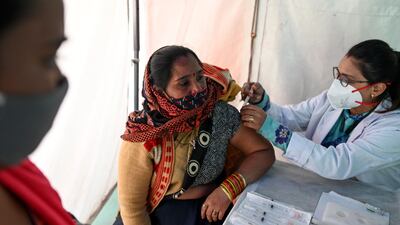Live updates: follow the latest news on Covid-19 variant Omicron
India reported a sharp increase in cases of the Omicron coronavirus variant on Sunday as the government announced that half of the adult population had been fully vaccinated against Covid-19.
The Health Ministry said more than 10 million doses were administered in the previous 24 hours, taking the overall number to more than 1.27 billion.
About 85 cent of the adult population has received at least one dose, it said.
“It is a moment of great pride as over 50 per cent of the eligible population are now fully vaccinated. We will win the battle against Covid-19 together,” Health Minister Mansukh Mandaviya wrote on Twitter.
The milestone was reached amid global fears that the Omicron variant could be even more contagious than the Delta strain that drove a deadly second wave of infections in India this year.
Scientists have not yet determined whether existing Covid-19 vaccines are effective against Omicron, which was first reported in South Africa in late November.
Indian health authorities confirmed 17 more Omicron cases on Sunday, taking the country's tally to 21.
Nine of the cases were in the city of Jaipur, Rajasthan state, among members of a family that had returned from South Africa.
Three students from Nigeria and their contacts accounted for seven cases detected in Pune city, Maharashtra.
New Delhi reported its first case in a 37-year-old man who returned to the capital from Tanzania.
He entered quarantine in hospital after complaining of a sore throat, weakness and body aches.
The earlier four cases were detected in Karnataka, Gujarat and Maharashtra. Three were linked to southern African countries considered high risk by Indian authorities.
Experts have emphasised the need to increase the vaccination rate after the Omicron variant was detected in the country.
“An individual who gets vaccinated can still get infected with Omicron, but the impact would be less for all of the variants and that’s why people should be vaccinated,” Chandrakant Lahariya, an independent virologist in Delhi, told The National.
India began its vaccination drive in January with a target of inoculating 950 million people aged 18 or older among its population of 1.3 billion by the end of the year.
The government approved the use of two locally manufactured shots – the Oxford-AstraZeneca vaccine, produced by the Serum Institute of India under the name Covishield, and Bharat Biotech’s Covaxin.
Russia's Sputnik V vaccine was approved in April.
Vaccine production was halted during the second wave of infection during which more than 25 million people were infected and at least 250,000 died.
The government has built up stocks of vaccine doses in recent months and began a door-to-door inoculation campaign to reach people in remote areas.
India has recorded more than 34 million Covid-19 cases since the pandemic began early last year, with 8,895 new infections reported on Sunday.
The overall death toll has increased to 473,326 after the states of Kerala and Bihar added 2,796 fatalities after reviewing their records.











